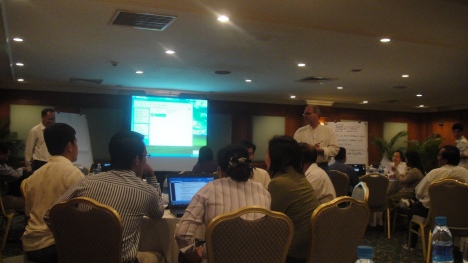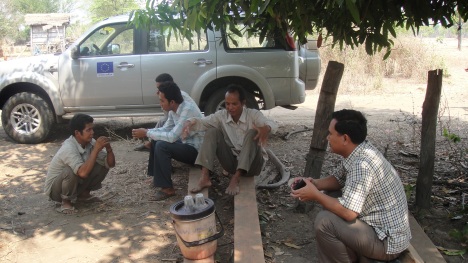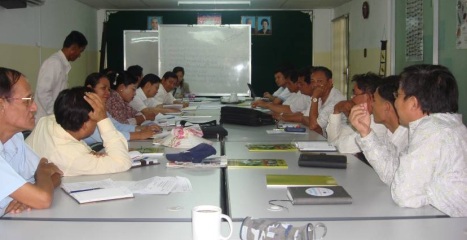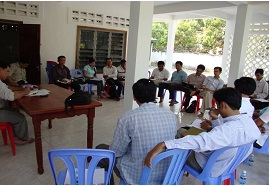On April 2-3, 2010 CEDAC organized a core staff meeting with the funding support by FNS at Phnom Pros Hotel in Kompong Cham Province. The president of CEDAC Dr. Yang Saing Koma played very important role to facilitate the meeting with the participation of 45 participants (9 women staffs). The purpose of the meeting was to review the CEDAC strategy 2010-2014, to analyze social trend for determining future development activities, to discuss about the mechanism for strengthening the cooperation between all components of CEDAC.
First of all, representatives of each CEDAC component shared the information relating to its progress of the last 3 months to each other. Later on, the participants conducted plenary review on the CEDAC Strategy 2010-2014. Then, the expectation of the meeting was given by the participants. Dr. Yang Saing Koma presented and discussed about the social trend related to the Agriculture and Rural Development Aspects in Cambodia from 1980, 2010 and up to 2020. Furthermore, the participants shared their personal observation and notions related to CEDAC’s development activities in recent years whether those activities are closely related to the current and future development activities or not. In addition, the participants also discussed to determine the future image for community development in 2010; CEDAC will target provide further development assistance at the sub-national level especially at the district level. It is expected that credit cooperative, community-based rice mill, community-based rice warehouse, farmer learning center, agriculture and rural development service provider association, community information center, community radio, etc. will be set up and functioned effectively in the communities to provide greater job opportunities within the communities.
As a result of the meeting, the participants are clear about the future image of each CEDAC component as well as they are quite sure about the CEDAC structure in the future. At the end day of the meeting, the participants agreed to organize core staff meeting every 3 months and the communication and information sharing among the core staffs will be conducted systematically.
First of all, representatives of each CEDAC component shared the information relating to its progress of the last 3 months to each other. Later on, the participants conducted plenary review on the CEDAC Strategy 2010-2014. Then, the expectation of the meeting was given by the participants. Dr. Yang Saing Koma presented and discussed about the social trend related to the Agriculture and Rural Development Aspects in Cambodia from 1980, 2010 and up to 2020. Furthermore, the participants shared their personal observation and notions related to CEDAC’s development activities in recent years whether those activities are closely related to the current and future development activities or not. In addition, the participants also discussed to determine the future image for community development in 2010; CEDAC will target provide further development assistance at the sub-national level especially at the district level. It is expected that credit cooperative, community-based rice mill, community-based rice warehouse, farmer learning center, agriculture and rural development service provider association, community information center, community radio, etc. will be set up and functioned effectively in the communities to provide greater job opportunities within the communities.
As a result of the meeting, the participants are clear about the future image of each CEDAC component as well as they are quite sure about the CEDAC structure in the future. At the end day of the meeting, the participants agreed to organize core staff meeting every 3 months and the communication and information sharing among the core staffs will be conducted systematically.









